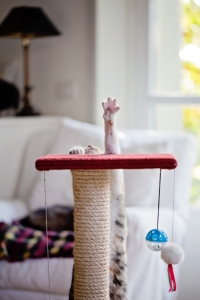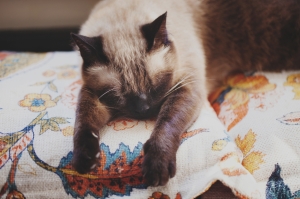Vaccinations play an important role in the control of infectious diseases for the individual cat, as well as the general cat population. A vaccination protocol should be developed by your veterinarian based on your cat’s likelihood of exposure to infectious agents, as well as his/her health and lifestyle.
Core Vaccinations for Cats
There are two core vaccinations that all cats should receive:
- FVRCP vaccine: This is a combination vaccination that protects your cat from the feline herpes virus, calici virus and panleukopenia viruses. The herpes and calici viruses are responsible for upper respiratory infections. The panleukopenia virus is sometimes called feline parvo and causes vomiting, diarrhea, life-threatening suppression of the immune system, dehydration, neurologic disease, and even death.
- Rabies vaccine: Rabies is transmitted from wildlife as well as unvaccinated animals. It can be transmitted from animals to humans through biting. Rabies cannot be treated once an animal is infected with the virus and will lead to death.
Non-Core Vaccinations
There are other vaccinations that are considered non-core vaccines and your veterinarian may recommend them based on your cat’s lifestyle. They include:
- Feline Leukemia (FeLV) vaccine: The feline leukemia virus is transmitted through saliva of infected cats and fomites (clothing, shoes, countertops, etc.). It can also be transmitted through the uterus from a queen to her kittens. It is a retrovirus that causes immunosuppression in cats. It can also predispose to the development of certain cancers, such as lymphoma or leukemia.
- Feline Immunodeficiency Virus (FIV) vaccine: FIV is another retrovirus that is transmitted through bites of infected cats. The vaccine can interfere with the routine laboratory tests used to determine if a cat has been exposed to the virus, so it is usually only recommended for high-risk cats (cats living in a household with FIV-positive cats). Much like the FeLV virus, it can cause suppression of the immune system, life-threatening infections and certain cancers.
- Chlamydophila felis vaccine: Chlamydia is a virus that can cause upper respiratory infections and eye infections. It is sometimes added to the FVRCP combo vaccine. It is most useful in situations like catteries or shelters where there are large numbers of cats living in a small, enclosed environment.
Vaccination schedules vary on the age of your cat and on the lifestyle of your cat. I recommend the American Association of Feline Practitioners guidelines. These guidelines were developed by a group of feline specialists, but it is still important that your veterinarian take into account your cat’s lifestyle, pre-existing illnesses, risk of infection, and previous vaccination reactions when discussing a vaccination schedule for your cat. In general, the following schedule is recommended for healthy cats:
- FVRCP: Starting at 8-9 weeks of age, a kitten should receive the vaccine every 3-4 weeks until 14-16 weeks of age. The vaccine given at 14-16 weeks of age will provide protection for 1 year. The vaccine then should be given every 3 years.
- Rabies: The vaccine is first given between 12 and 16 weeks of age and provides protection for 1 year. It is then given once every 1-3 years based on the state in which the cat lives. For example, in Washington state, there is a low incidence of rabies and the vaccine is given every 3 years.
- FeLV: The first vaccination is given to kittens older than 9 weeks of age and then a booster is given in 3-4 weeks. The booster then provides protection against FeLV for 1 year. The vaccination is repeated after 1 year. If a cat is indoor-only, this will be the last recommended FeLV vaccine. If a cat is an outdoor cat, the vaccine will be repeated once every 1-3 years based on risk of infection. Cats that fight frequently or live in areas with a large feral cat population would receive yearly boosters. Cats that only go outside to sun themselves on the patio would most likely receive the vaccine once every 3 years.
… But my cat never, ever goes outside. Does she still need to get vaccinations?
I am often asked if indoor-only cats need to continue to receive vaccinations. The answer to that question is usually yes if a cat is healthy.
Protection from the vaccines gradually subsides in the 3-year period. Rabies virus can be brought into the home through bats or raccoons. Owners can bring the herpes, calici or panleukopenia virus into the environment on their shoes or clothing. There are some theories that indoor cats are more susceptible to the panleukopenia virus because they do not receive boosting through the possibility of natural exposure. Introducing a new cat to the household or boarding at a kennel can also put an indoor cat at risk.
The Bottom Line
Your cat is an individual, and his/her needs are different from other cats’ needs. Your veterinarian should discuss benefits and risks of the recommended vaccinations with you during your cat’s annual exam. This will allow you to be an active participant in your cat’s health care team.



